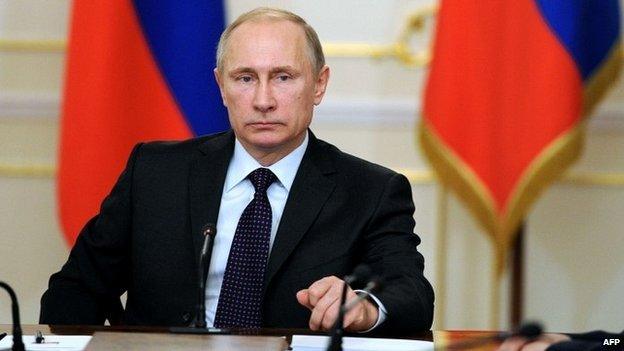Ukraine conflict: Putin 'was ready for nuclear alert'
- Published

President Putin says he only acted in Crimea after the government in Kiev was overthrown
President Vladimir Putin has said he was ready to put Russia's nuclear weapons on standby during tensions over the crisis in Ukraine and Crimea.
In comments in a documentary aired on state TV on Sunday, Mr Putin said the life of ex-Ukrainian leader Viktor Yanukovych had been in danger.
He also said Russians in Crimea were in danger before Russia annexed it.
In a previously released clip from the film, he said he ordered the annexation weeks before a referendum was held.
The BBC's John Simpson: "It's pretty hard to think Russia will ever give this up"
Crimea was formally absorbed into Russia on 18 March, to international condemnation, after unidentified gunmen took over the peninsula.
The documentary aired amid speculation over Mr Putin's whereabouts with the Russian leader having not been seen in public since 5 March.
The Kremlin has denied rumours that the president might be sick or even dead and says Mr Putin will meet his Kyrgyz counterpart, Almazbek Atambayev, on Monday.
'Our historical territory'
Speaking on the documentary - called The Path To The Motherland - Mr Putin said: "We never thought about severing Crimea from Ukraine until the moment that these events began, the government overthrow".
On putting Russia's nuclear weapons into a state of combat readiness, Mr Putin said: "We were ready to do this."
"[Crimea] is our historical territory. Russian people live there. They were in danger. We cannot abandon them," he added.
He said he used a "closed opinion poll" of Crimeans to judge whether they wanted to remain in Ukraine and found that "75% of the general population desired to join Russia". No details of how the survey was conducted were given by Mr Putin.
Russia initially denied that soldiers who appeared in Crimea without military insignia on their fatigues - dubbed the "little green men" - were Russian.
In March, Russian TV produced a lavish film on the annexation of Crimea
But Mr Putin subsequently admitted deploying troops on the peninsula to "stand behind Crimea's self-defence forces".
The formal annexation of Crimea sparked unrest in eastern Ukraine in April, when pro-Russian protesters occupied government buildings in Donetsk, Luhansk and Kharkiv demanding independence.
A month later, pro-Russian separatists in Donetsk and Luhansk declared independence from Ukraine after unrecognised referendums.
Ukraine responded by launching an "anti-terrorist operation" against them and the region became engulfed in a conflict which has cost at least 6,000 lives, according to the UN.

Timeline: How Crimea was annexed
22 February, former Ukrainian President Viktor Yanukovych flees Kiev after violent protests
23 February, Russian President Vladimir Putin plans to rescue Mr Yanukovych and annexe Crimea
27 February, pro-Russian gunmen seize Crimea's parliament and other key buildings
28 February, unidentified soldiers in combat fatigues occupy two airports in Crimea
1 March, Russian parliament approves Mr Putin's request to use force in Ukraine
16 March, voters in Crimea agree to join Russia in disputed referendum
18 March, Mr Putin signs a bill absorbing Crimea into the Russian Federation

The Ukrainian government, Western leaders and Nato say there is clear evidence that Russia is helping the separatists with heavy weapons and soldiers. Independent experts echo that accusation.
Moscow denies it, insisting that any Russians serving with the rebels are "volunteers".
'Good deed'
Full details of Mr Yanukovych's escape from Ukraine are unclear although Mr Putin spoke of Russian efforts to evacuate him and threats against his life.
"For us it became clear and we received information that there were plans not only for his capture, but, preferably for those who carried out the coup, also for his physical elimination," Mr Putin says in the film.
He said preparations to extract Mr Yanukovych were made by land, sea and air, saying "heavy machine guns" were placed in Donetsk "so as not to waste time talking".
Russia's Interfax news agency quoted Mr Putin as saying that saving the life of Ukraine's former leader and his family was a "good deed".
The documentary was made by Andrei Kondrashov, a journalist with state-run channel Rossiya-1.
